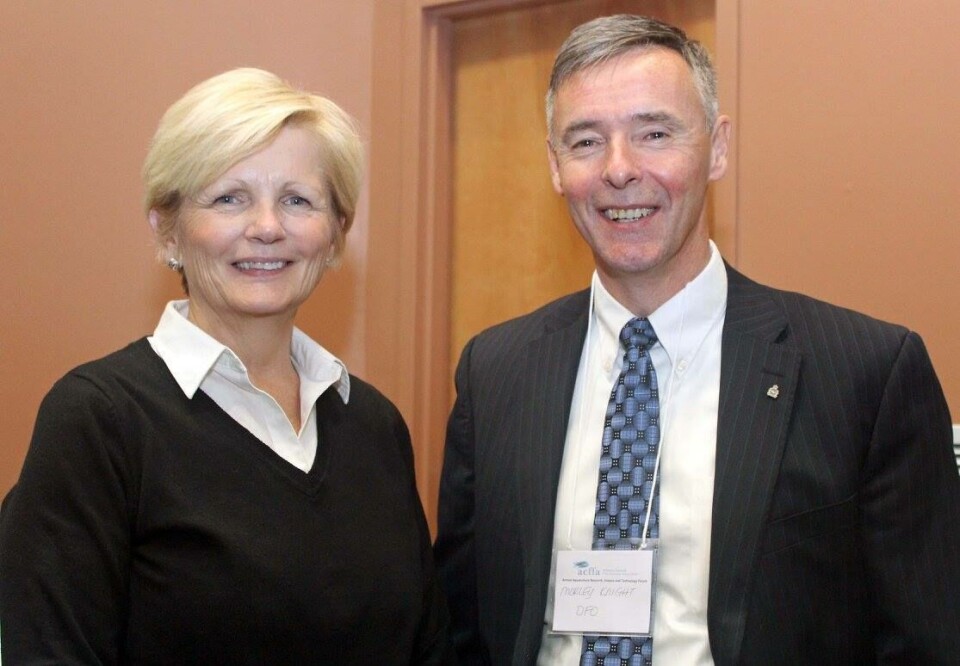
Scope for growth in Atlantic Canada
Canadian officials offered backing to grow the salmon aquaculture industry on the country's east coast during the annual two-day forum of the Atlantic Canada Fish Farmers Association (ACFFA) which took place this week.
The conference took place at the Huntsman Marine Science Centre and had two themes – day 1 was about collaboration and innovation, while day 2 was about fish health. Sue Farquharson, Executive Director of the ACFFA opened the forum by saying: “We have been fortunate to have a long list of great participants who have agreed to come and share their research and discuss with you how it applies to the sustainability of the aquaculture industry.”
Bright future for Atlantic Canada
Mr Morley Knight, Regional Director General of Fisheries and Oceans Canada (DFO Maritimes) provided opening comments to the attendees.

He acknowledged the commitment and work done by ACFFA, especially its board of directors, saying: “The association has played a key role in the development and ultimate success of salmon farmers since 1987. Salmon farming in Atlantic Canada has been revitalizing coastal communities across the region and directly contributes $350 million to the economy and employs over 3000 people – in Atlantic Canada, that is very significant.”
Knight said that, although there will be many challenges along the way, the strong relationship with ACFFA and the aquaculture industry will continue to enable the industry to overcome challenges and ensure that sustainable aquaculture succeeds in Atlantic Canada.
Commitment to growth
Knight was keen to emphasise the government's commitment to growing the industry, saying: “To ensure that growth takes place with an eye for success over the long term, our department is committed to developing and maintaining a strong and modern regulatory regime that enables growth while protecting the aquatic ecosystem for future generations of Atlantic Canadians.
“DFO has invested, over the past 5 years, $22 million in aquaculture regulatory science – this includes research that addresses regulatory policy needs and the collaborative research that industry over the years.
“Aquaculture is a vital part of the future economy for Atlantic Canada. The industry is looking to grow, and DFO is committed to working with you and the Atlantic provinces to achieve a clear, consistent regulatory process, and to help grow an environmentally and socially sustainable aquaculture industry here.
“I would like to thank ACFFA for [your] continued leadership in the aquaculture industry. I look forward to working closely with you and your efforts, and do believe the future is really bright for aquaculture industry in Atlantic Canada."
National Aquaculture Act remains a priority
Ruth Salmon, Executive Director of the Canadian Aquaculture Industry Alliance (CAIA), spoke to the attendees in what will be her last ACFFA Forum in that role.
“These types of meetings is what I’ll miss a lot,” said Salmon, adding that “it’s an exciting time to be in aquaculture.”
“Not only is aquaculture leading food production on a global scale, but now farmed fish is topping beef production. And that gap is widening every year – this is really significant,” she said.
However, she warned that Canada has been falling behind in terms of production growth, blaming the overly complex and uncertain federal and provincial regulatory system.
“I think Canada has been ill-served by a lack of regulatory coherence and consistency,” she said.

“We really support Prime Minister Trudeau’s government for openly stating that they support responsible and sustainable aquaculture growth in Canada.
“We welcome the opportunity to work with all parliamentarians as well as the federal and provincial governments on a modern legislative and regulatory framework for our sector including a new National Aquaculture Act.
“What our industry needs is a modern piece of legislation that is specifically designed to manage aquaculture in an effective and efficient manner. We believe that a modern Act with the right legal governance and policy framework will allow our industry to grow in a responsible and sustainable manner," she said
“Science has always been at the centre of this sector’s policy and regulatory regime,” said Salmon, applauding the significant financial commitment made by the federal government for science and research.
“The assurance that science provides us forms the uncontestable basis upon which future responsible development will occur,” Salmon concluded.























































